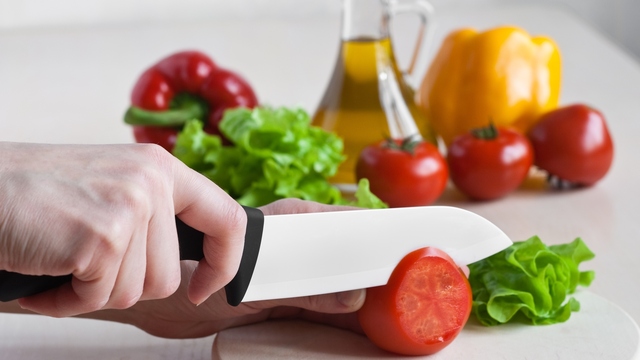 Andrey Kuzmin/PhotoSpin
Andrey Kuzmin/PhotoSpin
The kitchen is the place where people always seem to gather for nourishment of their bodies and their spirit. How many of us have a fond story that starts out around the kitchen or dining room table and ends in laughter?
But when you are diagnosed with cancer or another chronic illness that takes a toll on your body, eating food can become difficult. The kitchen can lose its magic and become a place to be avoided.
It can be frustrating and difficult to figure out what or how to eat. The foods you love can taste different or you might not have the energy to cook.
Research shows that patients tolerate cancer treatments better when they are well-nourished.
Put another way, when patients lose weight during treatments due to eating poorly, they don’t tolerate the treatments as well. It is vital to eat nourishing foods while you are going through these cancer treatments.
In the middle of treatment it can be truly challenging to discover foods you can tolerate so that you can break the seemly vicious cycle.
So what do you do?
One woman, Jackie Topol, who has a passion for helping others, found an answer that she shares with her patients. She created a program called The Nourishing Kitchen where she conducts cooking demonstrations on the leukemia/lymphoma unit at NewYork-Presbyterian Hospital.
Here Topol teaches patients and their family members how to manage side effects from treatment so that patients can optimize their nutritional intake as best as they can during cancer treatment. She believes that “food is medicine” and uses key ingredients in her recipes that target managing a variety of side effects.
Topol is a clinical dietitian for NewYork-Presbyterian Hospital on the oncology and cardiology units. She is helping her patients make food and the kitchen nourishing and welcoming once more.
After noticing that her lymphoma and leukemia patients were losing weight in between their chemotherapy treatments she decided to ask the hospital to fund her Nourishing Kitchen program. It took a few tries to get the funding Topol needed but she was determined to create an experiential learning environment.
She knew that “engaging patients and teaching them to cook for themselves is a much more effective way to ensure that they are better equipped to manage side effects when they are at home and without the supervision of a dietitian.”
Topol literally brings the kitchen to the oncology wing twice each month and teaches her lymphoma and leukemia patients how to cook delicious healthy recipes that they can try at the hospital and make when they get home.
She creates recipes that will help patients eat healthy and are easy to make, given that so many patients suffer from fatigue.
Since she started the program eight months ago she has seen improvements in her patients.
“I have had many patients tell me that the recipes have been helpful with either regaining weight that was lost or with maintaining their weight and that they now have a better understanding of what they need to add to foods so that they can taste it.”
Her carefully thought-out recipes are fashioned to reduce multiple side effects of the cancer therapies while helping patient maintain or gain back lost weight.
Each demo is about 45 minutes to one hour in length, as they need to be kept short because the patients can get easily fatigued. She prepares two recipes and hands out samples to all the participants. For those that are not able to attend they will have samples delivered to their beds so they can still participate.
Not only do the patients love it but the nurses and other health care professionals like to attend with the patients as well. Outpatients and patients that have other types of cancers are also invited to the cooking demo.
How did Topol develop such an effective and supportive program?
It came from her passion as she decided what career path was best for her. She started her journey as a food photographer but then decided she wanted a more meaningful career where she was helping people.
She went back to school for nutrition while also teaching kids cooking classes at the Jewish Community Center. Her mentor Julie Negrin, then the Director of Culinary Arts at the JCC, gave her the push to go back to get her Masters degree in nutrition and become a registered dietitian.
Topol completed her dietetic internship and then a fellowship in culinary nutrition at NewYork-Presbyterian. While she was a fellow she developed the concept of the Nourishing Kitchen and then applied for a patient-centered care grant to fund the program shortly after becoming a full-time dietitian there.
It took patience and persistence to get the proposal up and running in the unit but Topol said that it has been a “truly gratifying experience.”
The program has gotten such positive results that Topol is planning to ask the hospital to extend her grant for her program. Her vision for the future of the Nourishing Kitchen includes expand the program to other units as well as other campuses which are part of NewYork-Presbyterian Hospital.
The Nourishing Kitchens has a great message: food is our first medicine and it can be our best tasting medicine too.
Jackie’s program empowers the patients and their family members to take an active role in their treatment. It allows them to make lasting changes and create positive new memories in the kitchen during and after cancer treatments.
Source:
Phone interview with Jackie Topol November 25, 2014
http://www.jackietopol.com/about-me
Reviewed December 26, 2014
by Michele Blacksberg RN
Edited by Jody Smith





Add a CommentComments
There are no comments yet. Be the first one and get the conversation started!